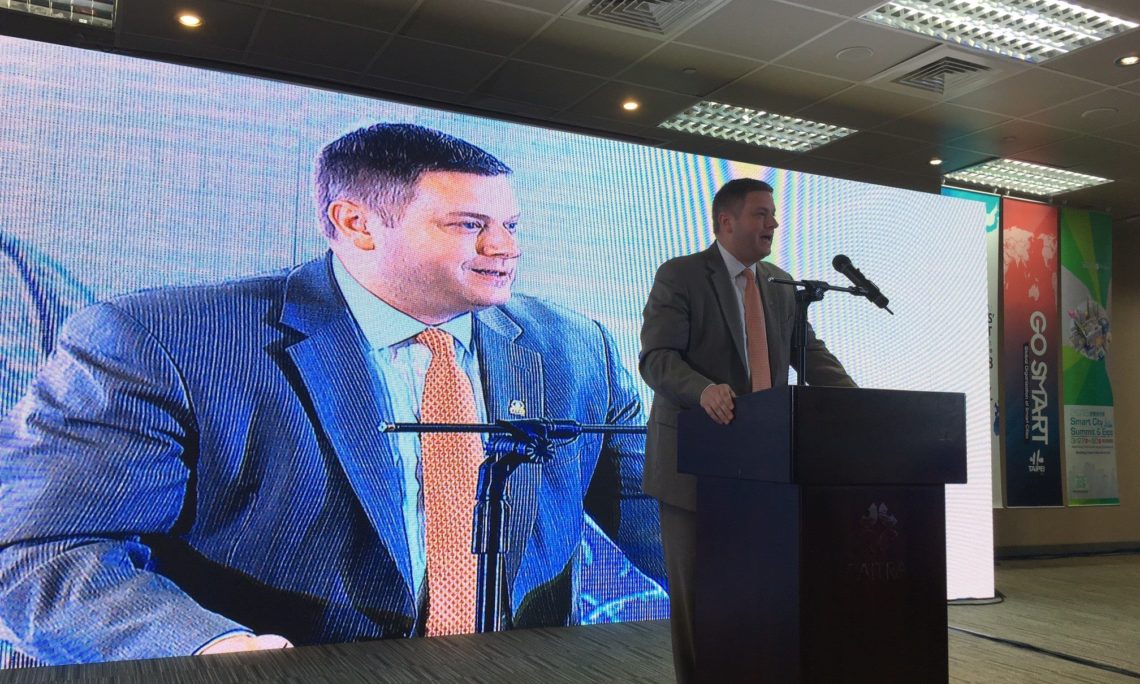OT-1804E March 27, 2018
Remarks by U.S. Deputy Assistant Secretary of Commerce for Manufacturing Ian Steff
at the Smart City Summit & Expo Mayor Summit
Nangang Exhibition Hall, Taipei
(As Prepared for Delivery)
I am pleased to be here today on behalf of the United States Department of Commerce. This is the final day of my very productive six-day official visit to Taiwan. I am thankful to everyone in Taiwan who contributed to our productive and successful engagements, including the organizers of the Smart City Summit & Expo and Mayors’ Summit today.
During my visit, I have seen first-hand the strength and depth of the U.S-Taiwan economic relationship. On behalf of Commerce Secretary Ross, I look forward to continuing to work together on our shared economic opportunities and challenges.
It is an honor to be here with representatives from cities around the world. The deployment of smart city technology, and more importantly the resulting benefits to citizens in your cities, is due to public-private cooperation and industry-driven innovation and solutions.
As we have all seen in our own communities, smart city technology is increasing economic growth and forging new markets; enabling new jobs in communities around the world; and making the infrastructure in cities and communities safer and more efficient. These benefits are clearly visible throughout the manufacturing sectors in my portfolio.
I would like to speak today about the opportunities and benefits I have seen for increased international collaboration on smart cities. I would also like to tell you about what the Department of Commerce is doing in this space.
It seems to me that the key to this international collaboration is increasing the flow of information, products, and investment.
Flow of information
Innovators are building the technologies that power smart city solutions, and local government leaders are innovating their operations to test out new approaches and to partner with technology providers.
But it is clear that no one can do this alone. By bringing our innovators together, we can share best practices between our communities, and strive to make the technology more replicable and scalable.
That is why my Commerce colleagues at the National Institute of Standards and Technology have created the Global City Teams Challenge. This is a platform that enables local governments, nonprofit organizations, academic institutions, technologists, and corporations from all over the world to form project teams to work on groundbreaking smart city applications.
The current round of the Challenge just started last month; I encourage everyone here to consider joining the program this year, and to attend the Expo event in the fall of 2018. For more information, please visit globalcityteams.org.
Flow of products and investment
We are working to create the conditions that will drive growth in the technologies enabling smart cities. We take an industry-driven approach.
At the Commerce Department’s International Trade Administration, our mission is to create prosperity by strengthening the international competitiveness of U.S. industry, promoting trade and investment, and ensuring fair trade and compliance with trade laws and agreements.
U.S. companies are leading the way in many smart city applications. Ensuring our companies can access foreign markets ensures that cities around the world can access leading-edge technology to help solve their urban challenges.
More generally, we continue to enhance our U.S. investment climate, equip our workforce, and strengthen our world-class innovation ecosystem.
In my role as Deputy Assistant Secretary of Commerce for Manufacturing, I am among those officials responsible for executing the Trump Administration’s plans to foster growth in U.S. manufacturing jobs and investments.
Our goal is to increase our manufacturing base by making it easier for our businesses to operate in the United States, and to encourage additional foreign manufacturing capacity investment. We are a country that makes things – things that have and continue to change the world.
I am happy to report positive developments on both fronts.
Our recent tax reforms have lowered the corporate tax rate from 35 to 21 percent. And for every new regulation implemented in 2017, we removed 22 regulations from the books. The net result is that over the past year, approximately 250,000 manufacturing jobs have been added in the United States.
The United States is open for business. I am here today to invite you to participate in our manufacturing and innovation ecosystem.
Let me conclude with this: I am confident that if we work together, share information on our smart city deployments, and ensure that all technology providers have a fair shot at smart city procurements, we will see unparalleled economic growth, job creation, and societal benefits in the near term.
















![Video Thumbnail [Recovered]-01](../wp-content/uploads/sites/269/Video-Thumbnail-Recovered-01-1-750x450.jpg)





